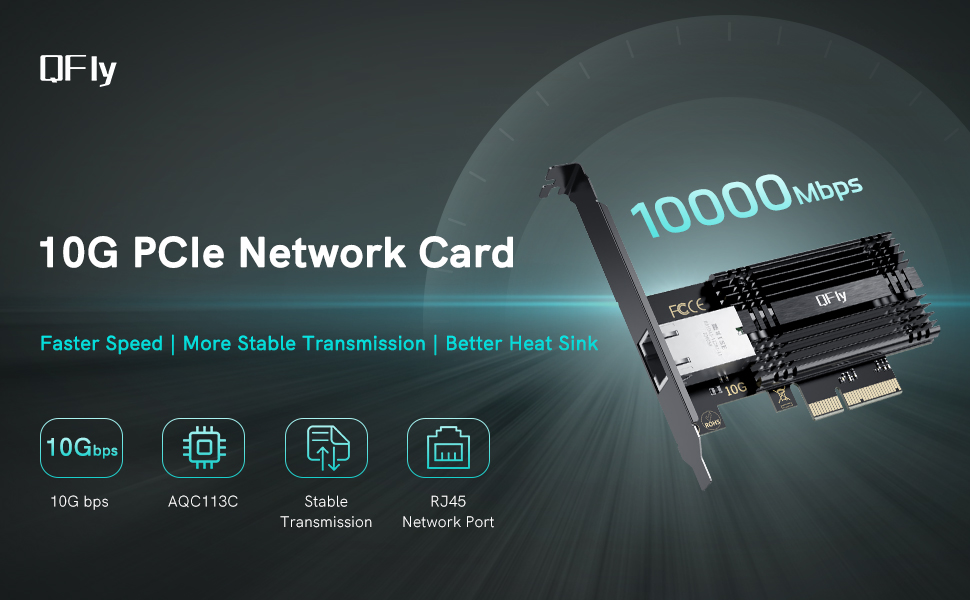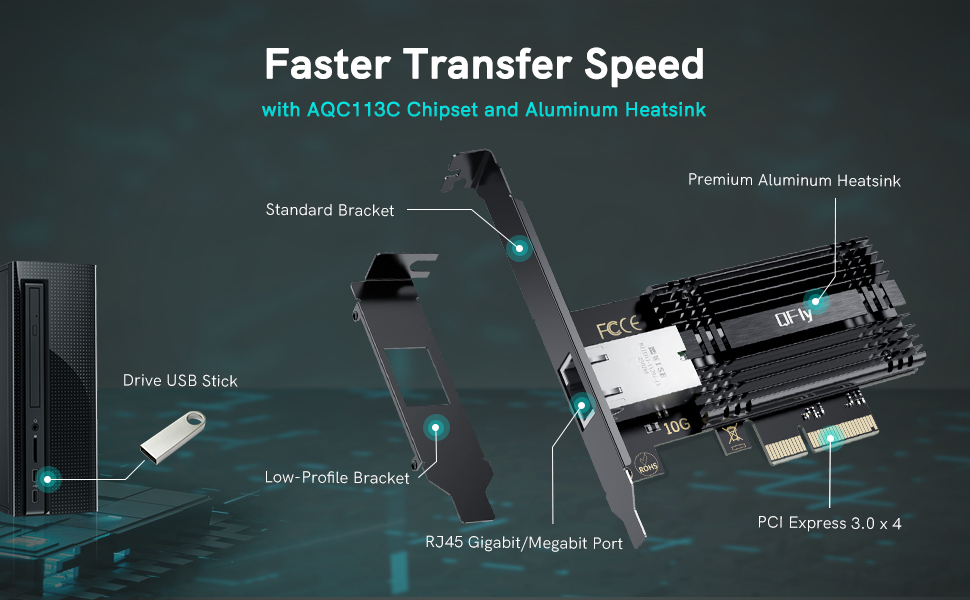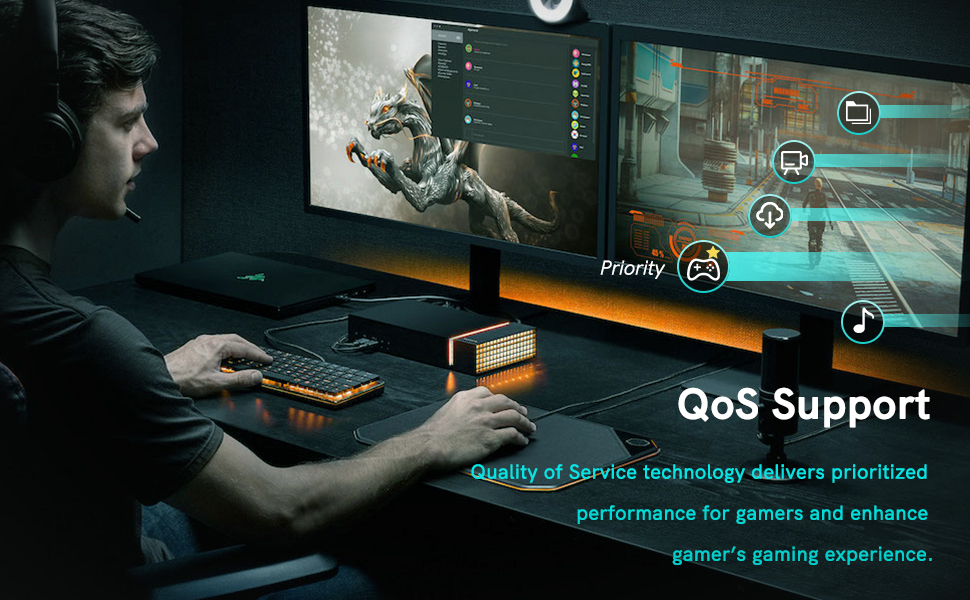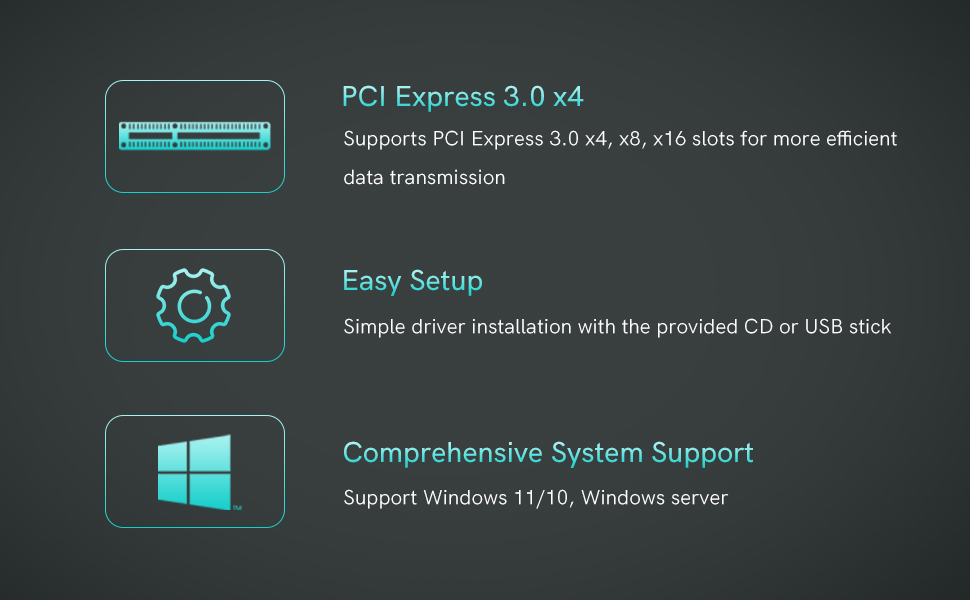






🚀 Elevate Your Network Game!
The 10Gb PCI-e Network Card is a high-performance adapter featuring the Marvell AQtion AQC113C Controller, delivering speeds up to 10Gbps. It supports multiple data rates and is compatible with Windows 10/11 and Server, ensuring a seamless user experience. With excellent heat dissipation and easy installation, this card is perfect for gamers and professionals seeking reliable network performance.






T**.
10 Gpbs QFly on Debian 12 - 9.91 Gbps max sustatined throughput
This is an initial review of the QFly 10 Gbps PCIe card on Debian 12 running kernel 12.12. No long term data available yet.The card was immediately recognized by Debian. No drivers needed to be loaded. Just needed to set IP, gateway and DNS addresses.I conducted sustained iperf3 tests through a 10G switch to a PC with the same Marvell controller chip on the motherboard. Initial sustained speeds were 9.42 Gbps (MTU=1500) until I set jumbo frames to MTU=9000 on both of the Marvell controllers. Once jumbo frames were set, sustained throughput jumped to 9.91 Gbps.The Marvell AQC113C controller chip supposedly supports 16K jumbo frames. The switch supports 12K jumbo frames which makes the switch the bottleneck for my test's max jumbo frame size.9K jumbo frames is a 6:1 reduction (from MTU=1500) in packet headers to process. 12K would be an 8:1 reduction in packet header processing possibly squeezing out a little more throughput. Throughput was consistent with 1, 2, 10 and 20 thread iperf3 tests.The card is tiny and the heat sink appears to be doing its job. The heat sink appeared larger than the heat sinks of its competitors, thus a purchase consideration. After a sustained hour run @ 9.91 Gbps, the passive heat sink was barely warm in the center with no case fans blowing on it.CPU utilization on an i7-6700 was [4-6]% under full bandwidth iperf3 tests (depending on selected tuned profile).Initial tests were done with new short and long Cat 8 cables. A second round of tests were conducted with 10+ year old house wiring with cable lengths up to 75 feet. Throughput was the same with the old cables as it was with the new Cat 8 cables.So far so go. Now to see if it lasts.Hope this information is helpful to someone.Update: Tried 12K jumbo frames which maxed out at 9.93 Gbps sustained throughput with ZERO retries, up from 9.91 Gbps with 9K jumbo frames. See attached green highlight for 1 hour sustained max throughput test. 4.06 TBytes transferred in 1 hour.
F**E
Quality 10Gbps, affordable
Bought three of these, and using them on a 2.5 Gbps switch for the moment. This is the newer AQC113C, so it's PCIe 4.0, so you don't need to have full 4X lanes to get full 10Gbps speeds. Even 4.0 1X should manage full 10Gbps link speed, and 3.0 1X in theory should work, but it's nice to have all 4.0 4X wired up on the card side, in case you want every last bit of performance.I have this running on Windows 11, I used the drivers from the included USB drive to get online, then grabbed the newest driver from Windows Update. No issues yet.I have this running on Arch Linux. It was detected and set up automatically, using in-kernel drivers. The Marvell ACQtion driver is included in the main Arch kernel, other distros have varying support. Check twice before buying, and you'll be happy!Performance tests with a 10Gbps switch to be added later.
W**N
Easy to install and use.
Extremely easy to install. Works great once the internet connected.
J**W
2.5G Dual doesn't have enough PCI-E bandwidth to max out both ports.
If your thinking of using this for SMB multichannel it wont work at full speed. Seems the card can only handle 1.75Gb when using both ports at the same time. Other than that the card works great.
T**D
Works fine on Windows and Linux, with caveats
Installed this into a new system running Debian 12 (bookworm) and it came up plug-n-play with no issues or fiddling, no doubt thanks to the new non-free-firmware setup. Transferred 20 TB over it with no problem, though it sat at ~80C the whole time - this could be due to not having sufficient airflow at that point, can't say for sure. In any case, I'd recommend you watch the temps on this one. Also note it was actually only running at 1GBit speeds for that, as the machine on the other end wasn't configured properly. But the network segment on the QFly end was 10Gbit.Then I moved the card to a Windows 10 machine and the drivers didn't come up automatically or via a Windows Update search using a different connected NIC. I had thrown out the packaging and CD at that point and couldn't find drivers online. The flash drive with the drivers comes up normally on Windows (*), and you just point Device Manager's driver search at that. Haven't put it through its paces on Windows yet, but it is working.(*) Note that if you want to mount the pack-in flash drive on linux you may have issues, since (on the one I got) there is no partition table(!) - fdisk gets confused by it and claims a nonsense partition layout because it's actually a bare filesystem, so you want to "mount /dev/sdX", NOT "mount /dev/sdX1". Don't know if automount systems can handle this gracefully or not.(Also final words: the review that says that this NIC doesn't work with "linux (pfsense)" is incorrect - the card works fine on linux, but pfsense isn't linux, it's FreeBSD. Always double-check compatibility for newer hardware before you buy if you're working with BSD, compatibility is generally worse than with linux.)No ragrets.
A**R
Very good card, but driver support is poor
I purchased this card for an existing Ubuntu 20.04 LTS Xen server. It works great, and fits very nicely into a 1U server chassis.But, the big problem is drivers. The manufacturer download site is laughable. The only option is to download a source version of the driver, once you find it, and then rebuild the driver and your kernel to include it. It would be one thing if this was for a really old or really new OS, but Ubuntu 20?Fortunately, I found a project on GitHub (awesometic/realtek-r8125-dkms) which builds and packages the driver. All you need to do is to install DKMS, and then install the downloaded .deb file, and all is well.In summary, this is a great little card, marred by terrible driver support. Apparently Ubuntu 22.04 LTS may include RTK8125 support built-in, but for older OSs, forget it.
Trustpilot
1 month ago
1 week ago
3 weeks ago
1 week ago